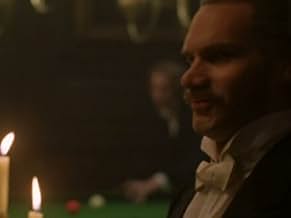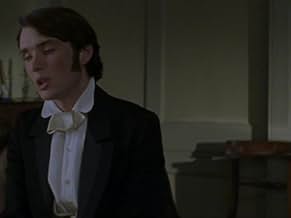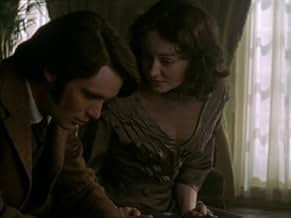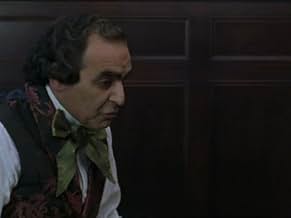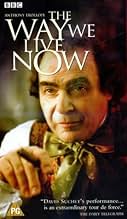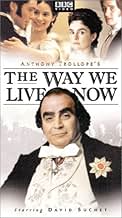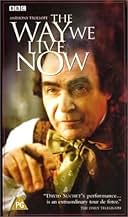Augustus Melmotte, un financiero de la ciudad nacido en Europa, cuyos orígenes son tan misteriosos como sus negocios. A las pocas semanas de llegar a Londres, anuncia una nueva empresa y pro... Leer todoAugustus Melmotte, un financiero de la ciudad nacido en Europa, cuyos orígenes son tan misteriosos como sus negocios. A las pocas semanas de llegar a Londres, anuncia una nueva empresa y promete fortuna instantánea.Augustus Melmotte, un financiero de la ciudad nacido en Europa, cuyos orígenes son tan misteriosos como sus negocios. A las pocas semanas de llegar a Londres, anuncia una nueva empresa y promete fortuna instantánea.
- Ganó 3 premios BAFTA
- 7 premios y 12 nominaciones en total
Reseñas destacadas
Taking this mini-series as an adaptation, it is not hard to see why it would disappoint. It's very condensed and also exaggerated, and it's also not as rich with not quite enough of the topical matters of the time explored in depth. The characters are still interesting (characters driven by greed preparing for a heavy hall which happens) and entertaining and the story fully absorbing with the subplots nicely fleshed out, just that it pales in comparison to the book.
In all honesty however, because of being so heavy and rich in detail and for its length, the book is very difficult to adapt (almost as difficult to adapt as Stephen King, Fyodor Dostoevsky and Leo Tolstoy) and, regardless of how disappointing it is in comparison, the 'The Way We Live Now' mini-series does laudably and is a solid and even very good to great mini-series on its own.
Of course there are things that stop it from living up to its even stronger potential, and forgive me if the flaws that have been covered in previous reviews are repeated (or shall we say somewhat parroted). Those flaws are the ending and two miscasts, while the many strengths far outweigh them they are big and jarring enough to not ignore. The ending is rushed and doesn't feel that well rounded off.
Cillian Murphy has shown considerable talent over the years, but here he's too delicate-looking, too young and rather effeminate and earnest. He doesn't convince as an engineer and doesn't fit the period either. Miranda Otto is strange and not in a good way. She plays her already pretty dumbed down character as a broad and annoying caricature and even more painfully attempts a Southern accent (and badly doesn't describe it, it's one of the all-time worst attempts at an accent to me) that sounds so overdone and so obviously fake with a bored-sounding drawl to match.
Luckily the rest of the cast more than make up for them. David Suchet dominates, playing a loathsome yet still fascinating character to gleeful perfection, a contender for his best non-Poirot performance. Shirley Henderson plays her emotional-roller-coaster-filled character very passionately and movingly, and Matthew MacFadyen is clearly enjoying himself as a cad but brings enough charm to make one believe how easy he is to fall for.
Douglas Hodge gives his very conflicted role a real humanity and Paloma Baeza has a slightly underwritten character but plays her with plenty of fire and intensity. Anne Marie Duff allows one to sympathise with her while also reminding us of how she is no much better than those who have shunned her, while Jim Carter brings much joy in a wonderful performance that has gone under-appreciated. Allan Corduner is spirited though a little more wit wouldn't go amiss and Cheryl Campbell is her usual dependable self.
'The Way We Live Now' looks fantastic, with evocative scenery, interiors, buildings and costumes that are striking on the eyes all captured perfectly by photography that is both atmospheric and luminous. The music score could not have been a better fit and also a fine score on its own, while there are some delicious bits of humour in the script with the satirical elements sharp and gleefully exaggerated at times and leaving enough room for insight. The storytelling is absorbing and compelling throughout the length, everything being easy to follow without being simplistic or over-complicated, and the characters are intriguing and enjoyable if with more meat to them in the source material.
Overall, very good mini-series that had the potential of being even stronger. 8/10 Bethany Cox
This novel is Trollope's longest, and possibly his most complex. Someone has estimated that there are over 100 named characters, and subplots abound. However, all the plots and subplots involve Augustus Melmotte, a shady character with grandiose schemes. Melmotte has the uncanny ability to make people want to give him money. He wants the money because his goal in life is to be an English gentleman.
If there had been a weak actor playing Augustus Melmotte, the whole movie would have fallen apart. This movie hung together because David Suchet played Melmotte so well. You'll have to see the film to know just how completely Suchet takes over the role of Melmotte.
Most of the supporting cast was at the usual high BBC level. Matthew Macfadyen plays Sir Felix Carbury, the cad, very well. Paloma Baeza plays Hetta Carbury, his lovely sister who is everything Sir Felix is not.
I think that the two weakest actors were Cillian Murphy as Paul Montague, and Miranda Otto as Mrs. Hurtle. Paul Montague is supposed to be the perfect Victorian hero. He's an engineer, and he isn't driven by greed. He's driven by the goal of designing and building the Mexican railroad. (The Mexican railroad is the starting point of Melmotte's rise to financial power.) The problem is that Murphy doesn't look or act the part. His character is not that different--in appearance or manner--from Sir Felix Carbury. They are supposed to be at opposite poles, but they aren't.
Miranda Otto is an Australian actor who has been given the role of an American from Oregon. Otto has a strong Southern US accent, which doesn't work. It's certainly possible that Mrs. Hurtle was originally from the U.S. South, and moved to Oregon. However, her Southern accent doesn't sound right, and it's clear that she is struggling with it whenever she's on screen.
As an interesting side note, Mr. Brehgert, a Jewish banker, is acted by Jim Carter, who plays Carson the butler on Downton Abbey. He's in love with an elegant Englishwoman, and his religion stands in the way of their marriage. His bank lends money to Melmotte. That's another subplot that revolves around the mysterious Augustus Melmotte.
I enjoyed this miniseries, and I recommend it highly. Without Suchet it could have been a failure. With Suchet, it's a triumph. We saw it on the small screen at home, and it worked very well. (There are a few outdoor scenes that would work better in a theater, but most of them are fillers put into the movie to "open it up." The real plots take place indoors, and they work well on DVD.) Seek out this movie and watch it! You'll be glad you did.
¿Sabías que...?
- CuriosidadesMrs. Hurtle indicates that the year is 1870. Trollope did his homework creating the fictional railroad enterprise. In 1870 Salt Lake City had almost three times the population of either Los Angeles or Denver, benefiting from the post-Civil War expansion westward and the booming silver and copper mines in the Intermountain West. Also by 1870 Salt Lake City was connected by rail to the Union Pacific Railroad and other smaller regional lines connecting to the mines. Building a railroad to haul ore from the US Rockies to a Mexican seaport on the Gulf of Mexico and to return with goods, supplies, and homesteaders made commercial sense and could easily have been supported in principle by a US Congress governed by America's Manifest Destiny.
- Citas
Sir Felix Carbury: I may not be possessed of great wealth or property, but I am a baronet and a gentleman.
Augustus Melmotte: And I'm not, you imply.
Sir Felix Carbury: No! No, that's not what I meant at all!
Augustus Melmotte: I think we understand each other very well. You're to provide the rank and position and I am to provide the money. That's the bargain. I buy my daughter a place in society by paying you to marry her.
- ConexionesFeatured in The Two Loves of Anthony Trollope (2004)
Selecciones populares
- How many seasons does The Way We Live Now have?Con tecnología de Alexa
Detalles
- Fecha de lanzamiento
- País de origen
- Sitio oficial
- Idioma
- Títulos en diferentes países
- The Way We Live Now
- Localizaciones del rodaje
- Empresas productoras
- Ver más compañías en los créditos en IMDbPro
- Duración1 hora 15 minutos
- Color
- Mezcla de sonido
- Relación de aspecto
- 1.33 : 1
Contribuir a esta página


